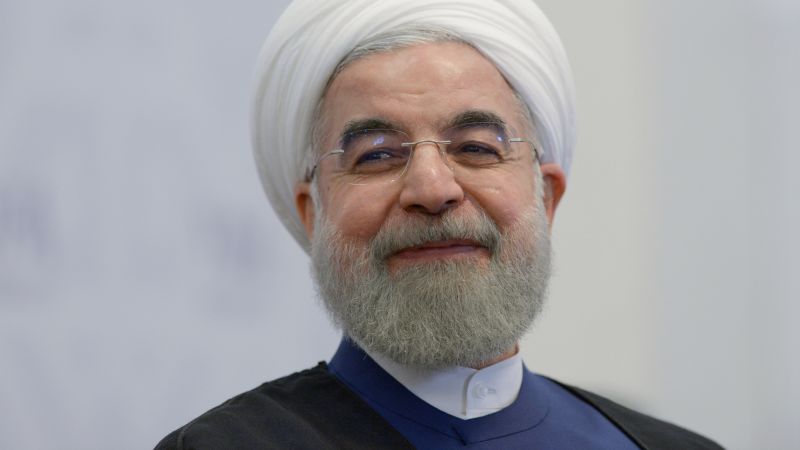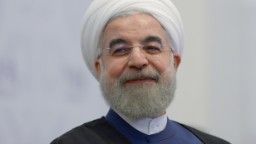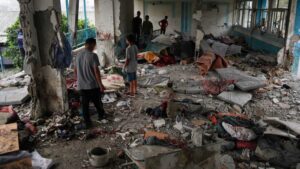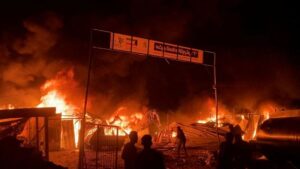Hassan Rouhani Fast Facts | CNN


CNN
—
Here’s a look at the life of former Iranian President Hassan Rouhani.
Birth date: November 12, 1948
Birth place: Sorkheh, Iran
Birth name: Hassan Feridon
Marriage: Sahebeh Arabi
Children: Has four children
Education: University of Tehran, B. A., 1972; Glasgow Caledonian University, M. Phil., 1995; Glasgow Caledonian University, Ph.D., 1999
Religion: Shiite Muslim
Rouhani is a cleric. His religious title is Hojatoleslam, which is a middle rank in the religious hierarchy.
Arrested many times in the 1960s and 1970s as a follower of Ayatollah Khomeini.
Iranian media refers to Rouhani as the “diplomat sheik.”
1960 – Begins his religious studies at a seminary in Semnan province.
1977 – Under the threat of arrest, leaves Iran and joins Ayatollah Ruhollah Khomeini in exile in France.
1980-2000 – After the overthrow of the Shah, Rouhani serves five terms in the National Assembly.
1983-1988 – Member of the Supreme Defense Council.
1985-1991 – Commander of the Iranian air defenses.
1988-1989 – Deputy commander of Iran’s Armed Forces.
1989-1997 – National security adviser to the president.
1989-2005 – Secretary of the Supreme National Security Council.
1989-present – Represents Supreme Leader Ayatollah Seyyed Ali Khamenei on Iran’s Supreme National Security Council.
1991-present – Member of the country’s Expediency Council.
1992-2013 – President of the Center for Strategic Research.
1999-present – Member of the Council of Experts, the group that chooses the Supreme Leader.
2000-2005 – National security adviser to the president.
2003-2005 – Iran’s chief nuclear negotiator.
June 14, 2013 – Wins the presidential election after securing more than 50% of the vote.
August 4, 2013 – Rouhani is sworn in as the seventh president of Iran.
September 19, 2013 – Writes a column in The Washington Post calling for engagement and “a constructive approach” to issues such as Iran’s nuclear weapons program.
September 25, 2013 – In stark contrast to his predecessor, Rouhani condemns the actions of the Nazis during the Holocaust.
September 27, 2013 – Speaks with US President Barack Obama by telephone, the first direct conversation between leaders of Iran and the United States since 1979.
July 14, 2015 – After negotiators strike a nuclear deal in Vienna, Rouhani touts the benefits of the agreement on Iranian television, declaring, “Our prayers have come true.” The deal calls for restrictions on uranium enrichment and research in exchange for relief from economic sanctions.
September 28, 2015 – Rouhani addresses the General Assembly of the United Nations, stating “A new chapter has started in Iran’s relations with the world.” However, he also says that America and Israel are partially responsible for the increase in global terrorism: “If we did not have the US military invasion of Afghanistan and Iraq, and the United States’ unwarranted support for the inhumane actions of the Zionist regime against the oppressed nation of Palestine, today the terrorists would not have an excuse for the justification of their crimes.”
September 22, 2016 – Speaking to global leaders at the United Nations General Assembly in New York, Rouhani accuses the United States of “a lack of compliance” with the nuclear deal agreed on in July 2015. Rouhani also attacks the United States for what he describes as “illegal actions,” referring to the US Supreme Court decision in April 2016 to allow US victims of terror to claim nearly $2 billion in compensation from Iran’s central bank.
May 20, 2017 – Rouhani wins reelection after securing approximately 57% of the vote.
September 20, 2017 – In a press conference following US President Donald Trump’s speech at the UN General Assembly calling the nuclear deal with Iran an embarrassment to the United States, Rouhani calls for an apology to the people of Iran for the “offensive” comments and “baseless” accusations, including Trump’s assertion that the “Iranian government masks a corrupt dictatorship behind the false guise of a democracy.”
July 22, 2018 – Addressing diplomats in Tehran, Rouhani warns the United States that war with Iran would be “the mother of all wars.”
September 25, 2018 – In an interview with CNN’s Christiane Amanpour, Rouhani says Iran is sticking to the nuclear deal. If the signatories remaining after the United States pulled out aren’t “living up to their commitments,” then Iran will re-evaluate.
November 5, 2018 – In public remarks made during a cabinet meeting, Rouhani says Iran will “proudly break” US sanctions that went into effect a day earlier. The sanctions – the second round reimposed after Trump pulled out of the nuclear deal in May – target Iran’s oil and gas industries as well as shipping, shipbuilding and banking industries.
May 8, 2019 – Rouhani announces that Iran will reduce its “commitments” to the Joint Comprehensive Plan of Action (JCPOA) but will not fully withdraw. In a televised speech, Rouhani says Iran will keep its excess enriched uranium and heavy water, rather than sell it to other countries as previously agreed to limit its stockpile.
July 3, 2019 – Rouhani announces Iran will begin enriching uranium at a higher level than what is allowed under the JCPOA. He vows to revive work on the Arak heavy-water reactor, which had been suspended under the nuclear deal.
September 26, 2019 – Rouhani announces Iran has started using advanced models of centrifuges to enrich uranium in violation of the JCPOA.
January 3, 2020 – Qasem Soleimani, leader of the Quds Force unit Islamic Revolutionary Guard Corps since 1988, is killed at Baghdad International Airport in an US airstrike ordered by Trump. Rouhani says the United States committed a “grave mistake” and “will face the consequences of this criminal act not only today, but also in the coming years.”
January 11, 2020 – Rouhani apologizes to the Ukrainian people after Iran’s armed forces downs a Ukraine International Airlines passenger jet in Tehran, mistaking it for a hostile target. He promises to hold those responsible for the January 8 tragedy “accountable,” according to the readout of a call with Ukraine President Volodymyr Zelensky.
June 19, 2021 – Ebrahim Raisi wins Iran’s presidential election.
August 5, 2021 – Raisi is sworn in, replacing Rouhani as president of Iran.








